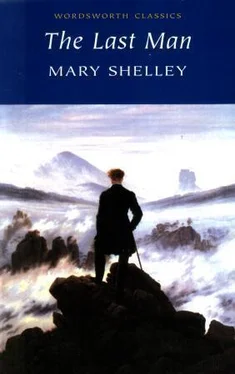Mary Shelley - The Last Man
Здесь есть возможность читать онлайн «Mary Shelley - The Last Man» весь текст электронной книги совершенно бесплатно (целиком полную версию без сокращений). В некоторых случаях можно слушать аудио, скачать через торрент в формате fb2 и присутствует краткое содержание. Год выпуска: 1826, Жанр: sf_postapocalyptic, на английском языке. Описание произведения, (предисловие) а так же отзывы посетителей доступны на портале библиотеки ЛибКат.
- Название:The Last Man
- Автор:
- Жанр:
- Год:1826
- ISBN:нет данных
- Рейтинг книги:3 / 5. Голосов: 1
-
Избранное:Добавить в избранное
- Отзывы:
-
Ваша оценка:
- 60
- 1
- 2
- 3
- 4
- 5
The Last Man: краткое содержание, описание и аннотация
Предлагаем к чтению аннотацию, описание, краткое содержание или предисловие (зависит от того, что написал сам автор книги «The Last Man»). Если вы не нашли необходимую информацию о книге — напишите в комментариях, мы постараемся отыскать её.
is Mary Shelley’s most important novel after
. With intriguing portraits of Percy Bysshe Shelley and Lord Byron, the novel offers a vision of the future that expresses a reaction against Romanticism, and demonstrates the failure of the imagination and of art to redeem the doomed characters.
From Publishers Weekly
Set in an apocalyptic future ending in the year 2100, Shelley’s 1826 novel concerns a plague that destroys almost all of humankind.
The Last Man — читать онлайн бесплатно полную книгу (весь текст) целиком
Ниже представлен текст книги, разбитый по страницам. Система сохранения места последней прочитанной страницы, позволяет с удобством читать онлайн бесплатно книгу «The Last Man», без необходимости каждый раз заново искать на чём Вы остановились. Поставьте закладку, и сможете в любой момент перейти на страницу, на которой закончили чтение.
Интервал:
Закладка:
The shelter, however, and less disturbed repose which I enjoyed, restored me the following morning to a greater portion of health and strength, than I had experienced since my fatal shipwreck. Among the stores I had discovered on searching the cottage the preceding night, was a quantity of dried grapes; these refreshed me in the morning, as I left my lodging and proceeded towards a town which I discerned at no great distance. As far as I could divine, it must have been Forli. I entered with pleasure its wide and grassy streets. All, it is true, pictured the excess of desolation; yet I loved to find myself in those spots which had been the abode of my fellow creatures. I delighted to traverse street after street, to look up at the tall houses, and repeat to myself, once they contained beings similar to myself—I was not always the wretch I am now. The wide square of Forli, the arcade around it, its light and pleasant aspect cheered me. I was pleased with the idea, that, if the earth should be again peopled, we, the lost race, would, in the relics left behind, present no contemptible exhibition of our powers to the new comers.
I entered one of the palaces, and opened the door of a magnificent saloon. I started—I looked again with renewed wonder. What wild-looking, unkempt, half-naked savage was that before me? The surprise was momentary.
I perceived that it was I myself whom I beheld in a large mirror at the end of the hall. No wonder that the lover of the princely Idris should fail to recognize himself in the miserable object there portrayed. My tattered dress was that in which I had crawled half alive from the tempestuous sea. My long and tangled hair hung in elf locks on my brow—my dark eyes, now hollow and wild, gleamed from under them—my cheeks were discoloured by the jaundice, which (the effect of misery and neglect) suffused my skin, and were half hid by a beard of many days’ growth.
Yet why should I not remain thus, I thought; the world is dead, and this squalid attire is a fitter mourning garb than the foppery of a black suit. And thus, methinks, I should have remained, had not hope, without which I do not believe man could exist, whispered to me, that, in such a plight, I should be an object of fear and aversion to the being, preserved I knew not where, but I fondly trusted, at length, to be found by me. Will my readers scorn the vanity, that made me attire myself with some care, for the sake of this visionary being? Or will they forgive the freaks of a half crazed imagination? I can easily forgive myself—for hope, however vague, was so dear to me, and a sentiment of pleasure of so rare occurrence, that I yielded readily to any idea, that cherished the one, or promised any recurrence of the former to my sorrowing heart.
After such occupation, I visited every street, alley, and nook of Forli. These Italian towns presented an appearance of still greater desolation, than those of England or France. Plague had appeared here earlier—it had finished its course, and achieved its work much sooner than with us. Probably the last summer had found no human being alive, in all the track included between the shores of Calabria and the northern Alps. My search was utterly vain, yet I did not despond. Reason methought was on my side; and the chances were by no means contemptible, that there should exist in some part of Italy a survivor like myself—of a wasted, depopulate land. As therefore I rambled through the empty town, I formed my plan for future operations. I would continue to journey on towards Rome. After I should have satisfied myself, by a narrow search, that I left behind no human being in the towns through which I passed, I would write up in a conspicuous part of each, with white paint, in three languages, that “Verney, the last of the race of Englishmen, had taken up his abode in Rome.”
In pursuance of this scheme, I entered a painter’s shop, and procured myself the paint. It is strange that so trivial an occupation should have consoled, and even enlivened me. But grief renders one childish, despair fantastic. To this simple inscription, I merely added the adjuration, “Friend, come! I wait for thee!— Deh, vieni! ti aspetto! ”
On the following morning, with something like hope for my companion, I quitted Forli on my way to Rome. Until now, agonizing retrospect, and dreary prospects for the future, had stung me when awake, and cradled me to my repose. Many times I had delivered myself up to the tyranny of anguish—many times I resolved a speedy end to my woes; and death by my own hands was a remedy, whose practicability was even cheering to me. What could I fear in the other world? If there were an hell, and I were doomed to it, I should come an adept to the sufferance of its tortures—the act were easy, the speedy and certain end of my deplorable tragedy. But now these thoughts faded before the new born expectation. I went on my way, not as before, feeling each hour, each minute, to be an age instinct with incalculable pain.
As I wandered along the plain, at the foot of the Appennines—through their valleys, and over their bleak summits, my path led me through a country which had been trodden by heroes, visited and admired by thousands. They had, as a tide, receded, leaving me blank and bare in the midst. But why complain? Did I not hope?—so I schooled myself, even after the enlivening spirit had really deserted me, and thus I was obliged to call up all the fortitude I could command, and that was not much, to prevent a recurrence of that chaotic and intolerable despair, that had succeeded to the miserable shipwreck, that had consummated every fear, and dashed to annihilation every joy.
I rose each day with the morning sun, and left my desolate inn. As my feet strayed through the unpeopled country, my thoughts rambled through the universe, and I was least miserable when I could, absorbed in reverie, forget the passage of the hours. Each evening, in spite of weariness, I detested to enter any dwelling, there to take up my nightly abode—I have sat, hour after hour, at the door of the cottage I had selected, unable to lift the latch, and meet face to face blank desertion within. Many nights, though autumnal mists were spread around, I passed under an ilex—many times I have supped on arbutus berries and chestnuts, making a fire, gypsy-like, on the ground—because wild natural scenery reminded me less acutely of my hopeless state of loneliness. I counted the days, and bore with me a peeled willow-wand, on which, as well as I could remember, I had notched the days that had elapsed since my wreck, and each night I added another unit to the melancholy sum.
I had toiled up a hill which led to Spoleto. Around was spread a plain, encircled by the chestnut-covered Appennines. A dark ravine was on one side, spanned by an aqueduct, whose tall arches were rooted in the dell below, and attested that man had once deigned to bestow labour and thought here, to adorn and civilise nature. Savage, ungrateful nature, which in wild sport defaced his remains, protruding her easily renewed, and fragile growth of wild flowers and parasite plants around his eternal edifices. I sat on a fragment of rock, and looked round. The sun had bathed in gold the western atmosphere, and in the east the clouds caught the radiance, and budded into transient loveliness. It set on a world that contained me alone for its inhabitant. I took out my wand—I counted the marks. Twenty-five were already traced—twenty-five days had already elapsed, since human voice had gladdened my ears, or human countenance met my gaze. Twenty-five long, weary days, succeeded by dark and lonesome nights, had mingled with foregone years, and had become a part of the past—the never to be recalled—a real, undeniable portion of my life—twenty-five long, long days.
Why this was not a month!—Why talk of days—or weeks—or months—I must grasp years in my imagination, if I would truly picture the future to myself—three, five, ten, twenty, fifty anniversaries of that fatal epoch might elapse—every year containing twelve months, each of more numerous calculation in a diary, than the twenty-five days gone by—Can it be? Will it be?—We had been used to look forward to death tremulously—wherefore, but because its place was obscure? But more terrible, and far more obscure, was the unveiled course of my lone futurity. I broke my wand; I threw it from me. I needed no recorder of the inch and barley-corn growth of my life, while my unquiet thoughts created other divisions, than those ruled over by the planets—and, in looking back on the age that had elapsed since I had been alone, I disdained to give the name of days and hours to the throes of agony which had in truth portioned it out.
Читать дальшеИнтервал:
Закладка:
Похожие книги на «The Last Man»
Представляем Вашему вниманию похожие книги на «The Last Man» списком для выбора. Мы отобрали схожую по названию и смыслу литературу в надежде предоставить читателям больше вариантов отыскать новые, интересные, ещё непрочитанные произведения.
Обсуждение, отзывы о книге «The Last Man» и просто собственные мнения читателей. Оставьте ваши комментарии, напишите, что Вы думаете о произведении, его смысле или главных героях. Укажите что конкретно понравилось, а что нет, и почему Вы так считаете.












